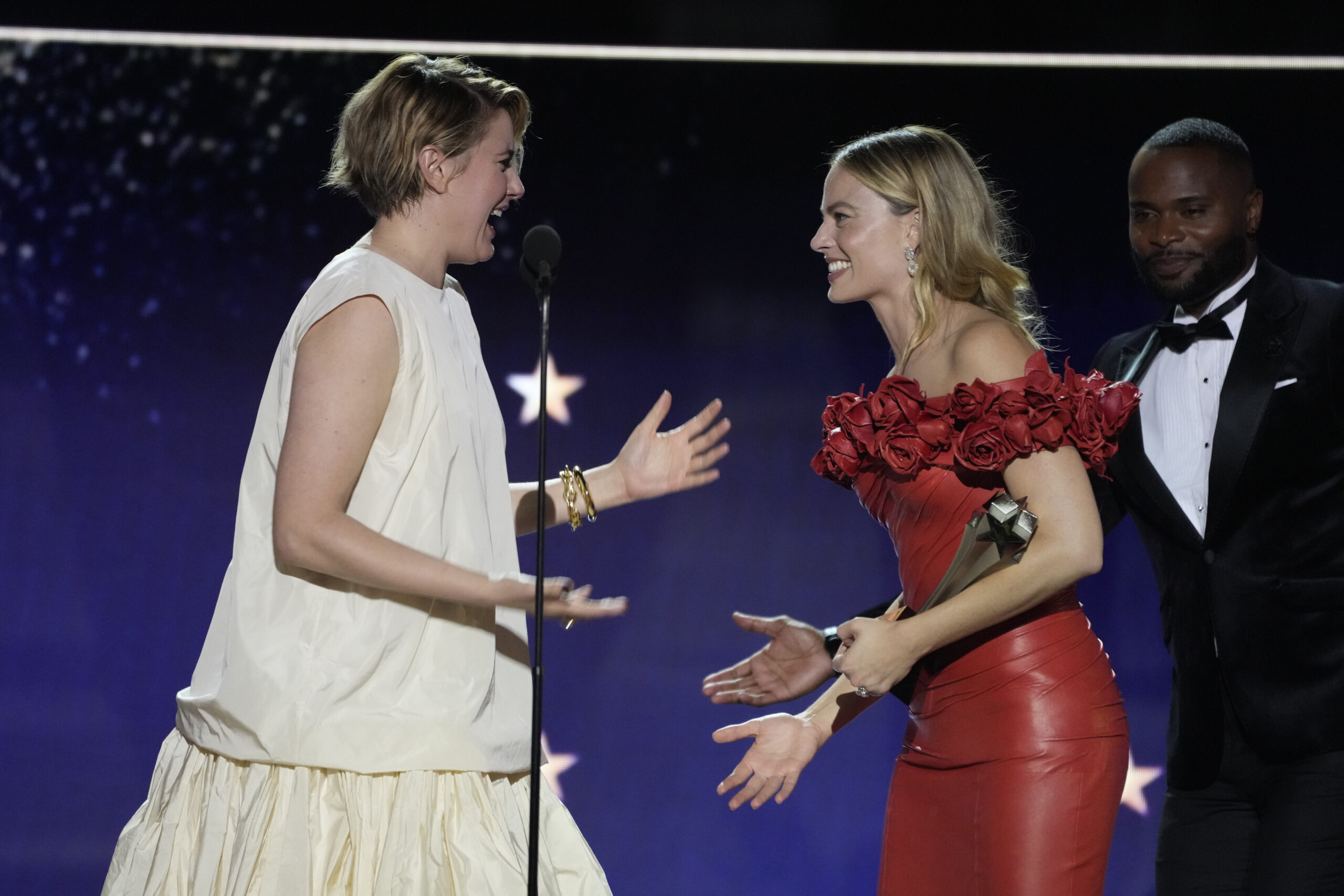NEW YORK (AP) — “Barbie” was the biggest hit of 2023, the highest-grossing movie ever directed by a woman and a bona fide cultural sensation that turned movie theatres pink and left a still-going trail of think pieces in the wake of Greta Gerwig’s feminist fantasia.
But while “Barbie” received eight Academy Awards nominations on Tuesday, including best picture, it was easily bested by its unlikely double-feature partner at the box office, “Oppenheimer.” And when the Academy Awards passed over Gerwig for best director and Margot Robbie for best actress, many saw some of the same patriarchy parodied in “Barbie” at work.
Even Ken was furious.
“There is no Ken without Barbie, and there is no ‘Barbie’ movie without Greta Gerwig and Margot Robbie, the two people most responsible for this history-making, globally celebrated film,” Ryan Gosling said. “No recognition would be possible for anyone on the film without their talent, grit and genius. To say that I’m disappointed that they are not nominated in their respective categories would be an understatement.”
By Wednesday, the backlash had already passed into the political realm. Hillary Clinton, posting on X, the platform formerly known as Twitter, wrote:
“Greta & Margot,
While it can sting to win the box office but not take home the gold, your millions of fans love you.
You’re both so much more than Kenough.
#HillaryBarbie”

Clinton’s post sent the internet into a frenzy that, from afar, looked something like the beachfront warfare that breaks out in “Barbie.” The firestorm on the heels of nominations ensures that the runup to the March 10 Oscars — which had started to feel like a straightforward march to coronation for “Oppenheimer” and a handful of frontrunners — will have plenty of drama.
Jimmy Kimmel, who will host those awards, has already weighed in. On Tuesday night’s “Jimmy Kimmel Live,” he quipped that Gosling being nominated for Ken while Robbie and Gerwig were snubbed “was kind of the plot of the ‘Barbie’ movie.”
If the summer phenomenon of Barbenheimer was defined by a strange counter-programming synergy that lifted both films up, the same dual effect didn’t quite transfer to the Academy Award nominations. The disparity was striking, in part, not just because of the strong support for “Barbie,” but because the Academy of Motion Pictures Arts and Sciences has a long history of overlooking women behind the camera and female-led films.
Gerwig, herself, has already been in the middle of that history. When she was nominated for best director in 2018 for “Lady Bird,” she was just the fifth woman nominated in the category. At the time, only Kathryn Bigelow had previously won best director. Since then, both Chloé Zhao (“Nomadland”) and Jane Campion (“The Power of the Dog”) have.
At the same time, Gerwig has been uniquely celebrated by the academy. Her first three films as a solo director — “Lady Bird,””Little Women” and “Barbie” — have all been nominated for best picture. On Tuesday, Gerwig and her husband, Noah Baumbach, with whom she co-wrote the film, were nominated for best adapted screenplay. (In another twist that didn’t delight “Barbie” fans, the academy deemed the script would be categorised as adapted.) Robbie, as a producer, shared in the best picture nomination.
Neither Gerwig nor Robbie has commented publicly yet on either the nominations the movie received or the ones they didn’t. Representatives for Gerwig and Robbie didn’t respond Wednesday to queries.
Meanwhile, debates raged about the nature of the “Barbie” snubs. Mary McNamara, the cultural columnist for The Los Angeles Times, wrote: “Did too many people (particularly women) enjoy ‘Barbie’ for it to be considered ‘important’ enough for academy voters? Did Robbie’s Barbie not suffer enough? Did Gerwig simply make it look too effortless? Was it just too pink?”
Sexism might have played a role. Yet Justine Triet, the filmmaker of the Palme d’Or-winning French courtroom drama “Anatomy of the Fall,” was among the nominees for best director, along with Christopher Nolan (“Oppenheimer”), Martin Scorsese (“Killers of the Flower Moon”), Jonathan Glazer (“The Zone of Interest”) and Yorgos Lanthimos (“Poor Things”). That left two Directors Guilds nominees — Gerwig and Alexander Payne (“The Holdovers”) — on the outside.
One likely factor: the increasingly international composition of the film academy. Partly to expand the diversity of Oscar voters, the academy is spread around the world more than ever; ballots were filed from a record 93 countries this year. Potentially, that may have favoured Europe-based filmmakers like Triet, Lanthimos and Glazer.
The academy could also point to another record: For the first time, three movies directed by women were nominated for best picture: Gerwig’s “Barbie,” Triet’s “Anatomy of a Fall” and Celine Song’s “Past Lives.”
Still, the end result — with the creative brains and star of the year’s most-talked about movie left out — just felt wrong to many.
“Greta Gerwig: Made a critically acclaimed, culturally profound, feminist movie about Barbie and the patriarchy that made a billion dollars at the box office,” activist Shannon Watts tweeted. “Oscar nomination goes to … Ken.”
Sometimes, a glaring snub can boomerang a flagging awards campaign. After Ben Affleck went unnominated for directing 2012’s “Argo,” voters rallied around his movie, ultimately handing Affleck the Oscar for best picture. Whether the same effect could follow “Barbie” will be one of the biggest questions leading up to the Academy Awards.
On Wednesday, Billie Jean King, who fought for and won equal pay for women in tennis, posted that she was “really upset” about the snubs.
“The movie is absolutely brilliant,” wrote King, “and Greta Gerwig is a genius.”






